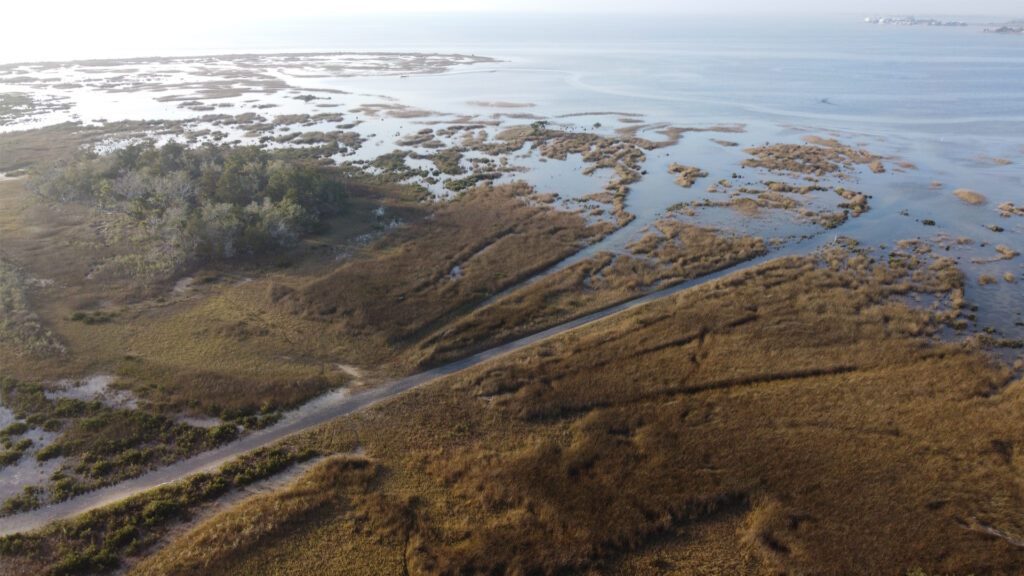By Bob Bendick, The Nature Conservancy
Climate change is not a distant threat. Several recent reports have shown that sea level rise has accelerated along the Southeast U.S. coast in the last 15 years. The Gulf of Mexico region is particularly vulnerable because of its low-lying lands, the frequency of hurricanes that are made more damaging by increasing sea temperatures and because many cities and towns are located at the water’s edge.
While we wait for policy and industry to catch up with the need for faster renewable energy adoption, there’s another way to adapt to climate change impacts: nature-based solutions.

Nature has long been a defender against erosion, storms and flooding. Oyster and coral reefs absorb wave energy. Mangroves offer a layer of protection against erosion. Coastal wetlands and freshwater marshes hold excess water. These natural features, called nature-based solutions, are an effective defense – but only if we protect and restore them.
The good news is that states in the Gulf of Mexico are making strides toward continued protection. Partnerships have been key, and The Nature Conservancy (TNC) has worked to promote and support important projects across the region.
In Louisiana, TNC has advocated for the inclusion of ecosystem restoration in the state’s Coastal Master Plan. These efforts include constructing large-scale barrier islands and rebuilding marshes that are eroding with rising waters. The Army Corps of Engineers has designed Mississippi River diversions that restore the natural process of distributing sediment from river to delta, naturally rebuilding marshlands.
In Alabama, TNC has worked with the commercial fishing and shipbuilding community of Bayou LaBatre to reduce coastal erosion and shield the port from storms by replanting upland vegetation and building breakwaters, marshes, tidal creeks and oyster reefs.
In the Florida Panhandle, TNC is assisting Tyndall Air Force Base (AFB) with its resilience projects after the base was severely damaged by Hurricane Michael in 2018. Tyndall AFB is building four nature-based solutions projects to help make the base more resilient to future storms. Additionally, TNC is working in the nearby Pensacola Bay system to restore oyster habitat to enhance ecosystem resilience and rebuild a sustainable fishery.

Deploying nature-based solutions takes hard work. Hundreds of young adults are supporting projects in Alabama, Florida, Mississippi, Louisiana and Texas through GulfCorps. A project led by TNC and the National Oceanic and Atmospheric Administration and supported by the RESTORE Council (Resources and Ecosystems Sustainability, Tourist Opportunities, and Revised Economies of the Gulf Coast States), GulfCorps puts nature-based solutions into practice. They have helped to build oyster reefs in Florida’s Apalachicola Bay, restored pitcher plant bogs in Alabama and Mississippi, constructed nests for water birds on Texas’ barrier islands and completed so many other meaningful projects.
Along with the jobs provided by GulfCorps, nature-based solutions support and sustain the commercial fishing industry, tourism and recreation – the cornerstones of Gulf communities’ economy and way of life.
Nature-based solutions can be useful at every scale and can help us adapt to climate change, especially when working in tandem with accelerated renewable energy adoption and innovation in engineered infrastructure. When deployed in the right way and in the right places, nature-based solutions help create a Gulf where people and nature thrive.
Bob Bendick is the Gulf of Mexico program director for The Nature Conservancy, a global environmental nonprofit working to reverse climate change and biodiversity loss.
If you are interested in submitting an opinion piece to The Invading Sea, email Editor Nathan Crabbe at ncrabbe@fau.edu. Sign up for The Invading Sea newsletter by visiting here.



